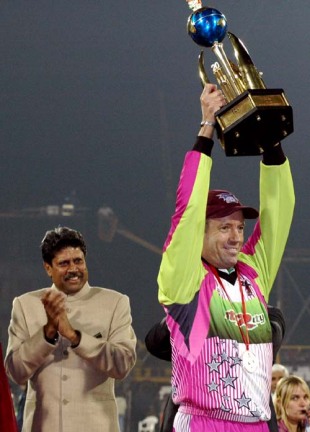|
|
|

Kapil Dev applauds as Stuart Law lifts the trophy at the end of the inaugural ICL event. Tim May argues 'no governing body has yet satisfactorily explained ... why ICL is such a danger to cricket'
© Cricinfo Ltd
|
|
| |
Tim May, the chief executive of FICA, the international players' association, has expressed his concern over attempts by national boards to impose bans on players who have signed for the unauthorised Indian Cricket League.
Making clear that FICA "neither supports nor rejects the ICL", May said that his organisation's primary aim "is to ensure that players rights are upheld and that governing bodies do not unreasonably restrain players from plying their trade".
He said players were only under an obligation to play exclusively for a body when they enter into a contract with them to that effect. "Where a player has chosen not to enter a contract with a particular governing body or alternatively has not been offered a contract the player should be free to play wherever he likes."
His comments come in the light of reported moves by the Pakistan and New Zealand boards to refuse to grant their players No Objection Certificates which are needed by them to play for English county sides. "What we are now seeing is that governing bodies are introducing a variety of measures that will limit the ability of players who play in the ICL being considered for competitions under the jurisdiction of those [boards].
"A governing body can devise its own qualification rules - it's whether they are unlawful or not, whether these will be acceptable to player associations. These are where the issues of unreasonable restraint of trade, discrimination and various anti-competitive behaviour arise."
May made it clear that "FICA and its player associations will defend the right of players to seek employment without fear of unreasonable restraint of trade, discrimination and the collusion of a number of bodies to monopolise employment and restrict movement in the market".
He said it remained unclear what the objection to the ICL is, "apart from it being an unwanted competitor. No governing body has yet satisfactorily explained to players' associations why ICL is such a danger to cricket. In any other walk of life, it's accepted that competitive markets are more desirable than monopolistic markets.
"We have heard public comments that ICL has the propensity to take a significant amount of the games' revenues away from the global revenue stream and that all countries will suffer accordingly. Incredibly the other countries just sat aside silently when the BCCI derived US$2 billion out of the games' potential revenues for the BCCI's exclusive use - which I presume was pretty much the same US$2 billion that ICL were suppose to suck out of the system.
"Countries have also objected to ICL revenues being diverted to private enterprise rather than the development of the game - they have conveniently cast a blind eye to the fact that a significant proportion of the ongoing profits of the 'official' IPL tournament will be distributed to private enterprises, not the game.
"I am staggered given cricket's significantly small number of professional cricketers that the creation of a further 60 or 70 professional positions is viewed as a negative for the game."
One argument put forward against the ICL is that it has no effective anti-doping policy. "Neither do half of the ten Test playing nations," May countered. "I don't hear countries saying they won't play other countries because they don't have anti-doping policies.
"For many, if not all, countries, the number of these players that will embrace IPL will only increase, as players are increasingly frustrated by low remuneration, lengthy absences from family and the direction and governance of our game. While all other sports are bending their backs to attract talent - cricket seems hell bent on ridding itself of its talent.
"The big question is ... what is more of a risk to the game. The ICL, or the policies being constructed by our governors?"
